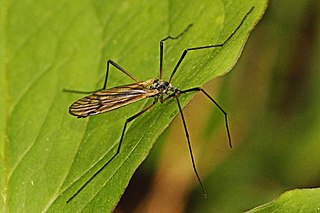
Convolvulaceae, commonly called the bindweeds or morning glories, is a family of about 60 genera and more than 1,650 species. These species are primarily herbaceous vines, but also include trees, shrubs and herbs. The tubers of several species are edible, the best known of which is the sweet potato.

The Planctomycetota are a phylum of widely distributed bacteria, occurring in both aquatic and terrestrial habitats. They play a considerable role in global carbon and nitrogen cycles, with many species of this phylum capable of anaerobic ammonium oxidation, also known as anammox. Many Planctomycetota occur in relatively high abundance as biofilms, often associating with other organisms such as macroalgae and marine sponges.

Limnophila aromatica, the rice paddy herb, is a tropical flowering plant in the family Plantaginaceae. It is native to Southeast Asia, where it flourishes in hot temperatures and grows most often in watery environments, particularly in flooded rice fields. It is called ngò ôm or ngò om or ngổ in Vietnam and used as an herb and also cultivated for use as an aquarium plant. The plant was introduced to North America in the 1970s due to Vietnamese immigration following the Vietnam War. It is called "ma om" (ម្អម) in Khmer. It is used in traditional Cambodian soup dishes and Southern Vietnamese cuisine. It can grow in flooded rice paddies during wet season but it grows best on drained but still wet sandy soil of harvested rice paddies for a few months after the rainy season ended. It dies out soon after it flowers. Rural Cambodians often harvest them and put them on the roof of their houses to dry for later use.

Limnophila sessiliflora, known as dwarf ambulia, ambulis, and Asian marshweed is a flowering plant in the family Plantaginaceae, mostly found in southeast Asia.

Limnophila is a genus of flowering plants in the family Plantaginaceae. It is distributed in tropical and subtropical regions of Africa, Asia, Australia, and the Pacific Islands. Species are known commonly as marshweeds.

Limnophila is a genus of limoniid crane flies in the family Limoniidae. There are at least 280 described species in Limnophila.
Rennera is a genus of South African flowering plants in the daisy family.
L. japonica may refer to:

Limnophila schranki is a cranefly in the family Limoniidae.

Hexatomini is a tribe of limoniid crane flies in the family Limoniidae. There are about 16 genera and at least 250 described species in Hexatomini.

Limnophila rufibasis is a species of limoniid crane fly in the family Limoniidae.
Limnophila marchandi is a species of limoniid crane fly in the family Limoniidae.

Limnophila macrocera is a species of limoniid crane fly in the family Limoniidae.
Philaronia is a genus of spittlebugs in the family Aphrophoridae. There are about five described species in Philaronia.
Limnophila angustula is a species of limoniid crane fly in the family Limoniidae.
Rhodoluna is a Gram-positive, non-spore-forming and non-motile genus of bacteria from the family of Microbacteriaceae. The type strain of the only species Rhodoluna lacicola encodes an actinorhodopsin, which is a light-diven proton pump enabling light energy conversion, potentially resulting in a mixotrophic physiology. The type strain of R. lacicola was isolated from Lake Tai in China. The type strain MWH-Ta8 is remarkable for its very small cell size ultramicrobacterium and its small genome size of only 1.4 Mbp. The type strain has a planktonic lifestyle, that is freely floating the water column of aquatic systems. Currently, the genus Rhodoluna contains two described species.








